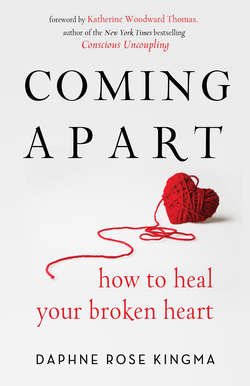Читать книгу Coming Apart - Daphne Rose Kingma - Страница 17
На сайте Литреса книга снята с продажи.
3 Exploding the Love Myths: Why Are We Really in Relationships?
ОглавлениеJOHN AND DEBORAH FELL IN LOVE when they were both in their late twenties. They'd both had a number of puppy love relationships and were now eager to settle down. He'd been out of college for a couple of years and now was working as a bank management trainee. She was just finishing college.
They had a number of friends in common. She was attracted to his steadiness—“He was so peaceful and comforting”—and he was drawn to her liveliness and affection—“She really adored me.” The shy beginning of their romance (“I was the one who called him for our first date,” Deborah confessed) flowered into a series of dates and excursions, mutual appreciation of one another, and the feeling that there was no reason whatsoever why there shouldn't be more—a lifetime of what already felt so good to them. After living together in peace and delight for more than a year, they decided to get married.
When Marie and Neil fell in love, everyone thought they were the perfect couple. Neil was a dashing 6'5″; Marie was a dazzling, willowy blond.
“It was love at first sight,” according to Marie. “He was just my type of man, grown-up, handsome, accomplished. He met all my criteria for a mate, and when he chose me in return, it was more than I ever could have asked.
“It wasn't just surface, either. We had a lot of things in common. We were both in business. He was a few steps ahead of me when I was starting out and available to give me the guidance I needed. He was my hero and my colleague. My ideal. I felt like the luckiest woman in the world. Six months later, we got married.”
In general, when we tell the stories of falling in love, they follow a very specific format: They fell in love, got married, and lived happily ever after. In our unconscious mythologies of love, we see marriage—the cementing of a relationship through the ceremony of marriage—as a destination. We assume that marriage itself is the goal. We assume that love will drop us off at the doorway of a committed relationship and that once we have walked through it, all will be well. More of the same until the end of time. We expect that the high-riding, ebullient, positive feelings that cause us to fall in love will sustain us through all the years of our relationships, that love will dissolve our differences and conquer all. We presume, in a sense, that relationships are about the supremacy of love, that they will meet all our needs and last forever.
However, as the very existence of this book testifies, there is more to a marriage than simply setting it up. A lot goes on in the house of love and, rather than being a destination, relationships are often just a roadside inn, a stopping place on our journeys through life.
So if relationships aren't, in the end, about living happily ever after, about love that conquers all, then what are they really about, you may ask. Why do we really fall in love?
The reason we fall in love is to help us accomplish our external and internal developmental tasks.
